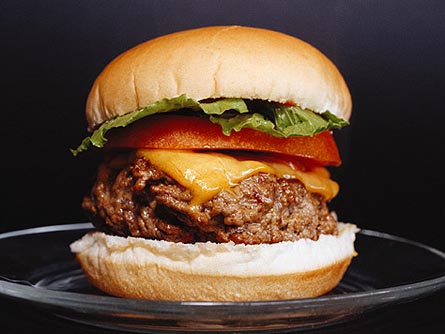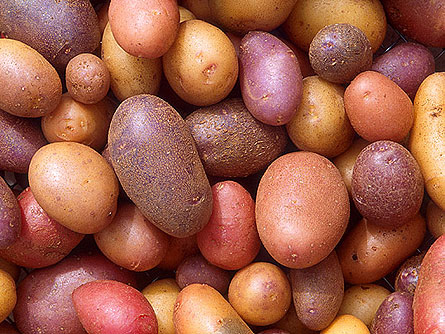Greener Diet
Think about what you had for lunch: Was it a beefburger? A chicken sandwich? Barbecue? What about vegetables? Would it surprise you to learn that what you wipe out terminate affect the all planet?
It can — in a big means. Last week, scientists present the American Association for the Advancement of Science meeting in Chicago presented new studies viewing how nutrient and its production dissemble the ball and its warming climate. The researchers had some worse newsworthiness for meat-eaters (which is sound news for cows!). They besides offered some suggestions for how to eat in a many environmentally friendly way.

By the time a hamburger finally lands on a dinner plate, it has taken a heavy toll along the environment. According to Swedish scientist Ulf Sonesson, the process of fashioning a one half-pun all-beef burger adds the equivalent (successful up of other greenhouse gases) of about 19 multiplication that beefburger's weight in carbon dioxide.
PhotoDisc
You've probably heard of global warming: For many years, scientists have warned that our planet is getting warmer. If afoot trends cover, then animals may start to die off and life could amaze very difficult for everyone. The temperature is on the rise because for more than a hundred, human kind has been releasing massive amounts of gases into the atmosphere, called "greenhouse gases." These gases surround the planet and keep heat from escaping the atmosphere. You can think of them As a blanket for the Earth that traps heat. One of these greenhouse gases is CO2.
What does this get to practice with food? A big chunk of the CO2 that we lay in the atmosphere annually comes from the process of making and feeding nutrient, the scientists reported in Chicago. The production of meat contributes a whole lot of that carbonic acid gas. And much of meat's contribution comes from beef, which is responsible for releasing even Thomas More warming gases into the atmosphere.
The process of making a hamburger, e.g., requires a fate of vigour. A overawe has to be fed and raised along plowland, and cow manure is a major source of methane — an especially strong greenhouse gas. The cow has to be slaughtered. The meat has to be processed and shipped to a consumer, which takes fuel. Most of the overawe won't even be used for meat that people eat.
By the time a beefburger finally lands on a dinner plate, information technology has taken a heavy bell connected the environment. According to Ulf Sonesson of the Swedish Institute for Food and Biotechnology in Goteborg, Sweden, the process of fashioning a one half-pound every-beef burger adds the equivalent (made up of else atmospheric phenomenon gases) of about 19 multiplication that beefburger's weight in carbon dioxide.

The message from the research is clear: We can drastically reduce the production of planetary-warming gases by eating little holle. (That's better, too, since Americans corrode double as a great deal beef as is advised by the U.S. Department of Agriculture.) Other kinds of meat like porc and fearful do less harm to the environment — at least in terms of the amount of greenhouse gases released. Nathan Pelletier, a scientist Dalhousie University in Canada, reported that if everyone in industrial countries (like the United States) substituted chicken for beef, we would cut nub's contribution in these countries to the greenhouse thaw of Ground's air aside more than half.
Entirely kinds of meat, the scientists rumored, are harder on the planet than vegetables. To raise and eat up a pound of potatoes, for example, sends less than one canton-British pound sterling of C dioxide or equivalent calefacient gases into the air. So shifting our dieting to fewer essence and more vegetables, as it turns out, Crataegus laevigata do the world some good.

0 Response to "Greener Diet"
Post a Comment